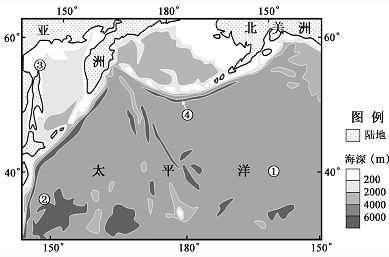下图是北太平洋局部海域海底地形简图。读图回答下列问题。(10分)

(1)根据《联合国海洋法公约》规定,①处海域属于 。该处海底储量巨大的矿产资源是 。海上航行、海底隧道和港口建设均利用的海洋资源类型是 。(3分)
(2)①②④三处比较,表层海水温度最低的是 处,原因主要是 。(2分)
(3)2011年12月18日,③处附近一座海上石油钻井平台倾覆,救援船只因舷窗破损进水导致作业中断。造成这次救援中断的主要自然原因可能是 、 。(2分)
a.天气严寒 b.台风影响 c.海浪和海冰冲击 d.海水污染严重
(4)④处海底地形类型为 。试分析其形成的主要原因。 (3分)
(1)公海 多金属结核(或锰结核、铁锰结核) 海洋空间资源
(2)④ 纬度高
(3)a 6
(4)海沟 大洋板块与大陆板块碰撞,大洋板块向下俯冲
本题综合考查学生对海洋等知识记忆、掌握和理解分析能力。
(1)①处海域根据经纬度范围可以看出已经超过了领海范围,太平洋海底分布着广泛的深海锰结核,而修建海底隧道和在海上航行主要使用了海洋空间资源。
(2)①②④中④纬度较高,纬度比较靠近主要考虑洋流影响,纬度相差较大则主要考虑太阳辐射的纬度差异。
(3)冬季救援船只在纬度较高的③处容易受到极地附近东风的影响和气温较低海冰等影响。
(4)④处位于板块交界边界,大洋板块俯冲容易在海洋上形成深邃的海沟。
